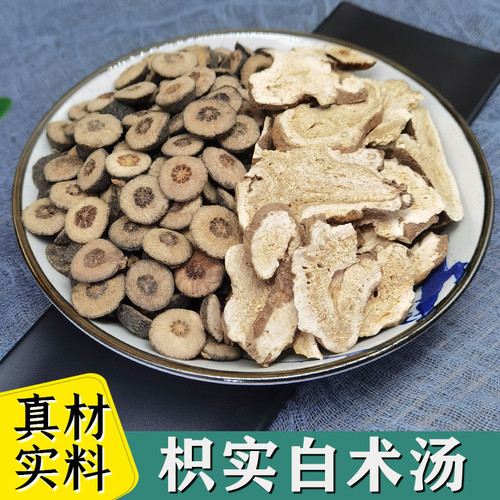Product Overview
Parts used: Dried rhizome Powder
TCM category: Tonic herbs for Qi Deficiency
TCM nature: Warm
TCM taste(s): BitterSweet
Meridian affinity: Spleen Stomach
Scientific name: Atractylodes macrocephala
Use of atractylodes rhizomes (Bai Shu) in TCM
Please note that you should never self-prescribe TCM ingredients. A TCM ingredient is almost never eaten on its own but as part of a formula containing several ingredients that act together. Please consult a professional TCM practitionner, they will be best able to guide you.
Preparation: Remove impurities, soak in water, wash, slice and dry.
Dosage: 3 - 9 grams
Main actions according to TCM*: Tonifies the Spleen Qi. Fortifies the Spleen Yang and dispels Damp through urination. Tonifies Qi and stops sweating. Calms restless fetus when due to Deficiency of Spleen Qi.
Primary conditions or symptoms for which atractylodes rhizomes may be prescribed by TCM doctors*: Loss of appetite Abdominal colic Abdominal bloating Diarrhea Palpitations Edema Night sweats Miscarriage
Contraindications*: This herb should not be used by those with Yin Deficiency with Heat signs or with extreme thirst.
Common TCM formulas in which atractylodes rhizomes are used*:
For Dampness and edema combine atractylodes rhizomes with poria-cocos mushrooms (Fu Ling), polyporus (Zhu Ling), water plantain (Ze Xie) and cinnamon twigs (Gui Zhi).
For Cold Stomach and Spleen with abdominal pain, diarrhea and lack of appetite combine atractylodes rhizomes with cloves (Ding Xiang), amomum fruits (Sha Ren) and dried ginger (Gan Jiang).
For general Qi tonification combine atractylodes rhizomes with ginseng (Ren Shen), poria-cocos mushrooms (Fu Ling) and liquorice (Gan Cao).
For Cold type dysentery and diarrhea caused by Deficient Spleen Qi combine atractylodes rhizomes with nutmeg (Rou Dou Kou) and codonopsis roots (Dang Shen).
For Cold Spleen, Stomach and Kidneys with abdominal pains, lack of appetite and loose stools combine atractylodes rhizomes with cinnamon bark (Rou Gui), dried ginger (Gan Jiang), ginseng (Ren Shen) and prepared aconite (Zhi Fu Zi).
For symptoms of abdominal pain, nausea and vomiting combine atractylodes rhizomes with sharp-leaf galangal fruits (Yi Zhi Ren), codonopsis roots (Dang Shen) and dried ginger (Gan Jiang).
For edema with weakness combine atractylodes rhizomes with stephania roots (Fang Ji) and milkvetch roots (Huang Qi).
For conditions such as anemia, weakness, tiredness, irregular menses caused by exhaustion or postpartum recovery combine atractylodes rhizomes with ginseng (Ren Shen), poria-cocos mushrooms (Fu Ling), liquorice (Gan Cao), dong quai (Dang Gui), szechuan lovage roots (Chuan Xiong), prepared rehmannia (Shu Di huang), white peony roots (Bai Shao), fresh ginger (Sheng Jiang) and jujube dates (Da Zao).
For the treatment of prolapsed Qi with symptoms of chronic fatigue and weakness as a result of physical exertion or stress combine atractylodes rhizomes with bupleurum roots (Chai Hu), codonopsis roots (Dang Shen), milkvetch roots (Huang Qi), ginseng (Ren Shen), liquorice (Gan Cao), dong quai (Dang Gui), bugbane rhizomes (Sheng Ma) and tangerine peel (Chen Pi).
For Spleen Qi deficiency combine atractylodes rhizomes with king solomon's seal roots (Huang Jing) and codonopsis roots (Dang Shen).
For Damp-Cold in the Spleen combine atractylodes rhizomes with tsaoko fruits (Cao Guo) and houpu magnolia bark (Hou Pu).
For Diarrhea due to Damp-Cold combine atractylodes rhizomes with sichuan pepper (Hua Jiao), tangerine peel (Chen Pi) and costus roots (Mu Xiang).
For Spleen deficiency with lack of appetite and fatigue combine atractylodes rhizomes with malt (Mai Ya) and codonopsis roots (Dang Shen).
For Spleen deficiency with chronic diarrhea combine atractylodes rhizomes with cherokee rose fruits (Jin Ying Zi), codonopsis roots (Dang Shen) and yam (Shan Yao).
For chronic diarrhea due to Spleen Yang deficiency combine atractylodes rhizomes with pomegranate peel (Shi Liu Pi), codonopsis roots (Dang Shen) and poria-cocos mushrooms (Fu Ling).
Key TCM concepts behind atractylodes rhizomes (Bai Shu)'s properties
In Traditional Chinese Medicine (TCM), atractylodes rhizomes are plants that belong to the 'Tonic herbs for Qi Deficiency' category. Tonic herbs are used for patterns of Deficiency, when one lacks one of the 'Four Treasures' (Qi, Blood, Yin and Yang). Qi tonics are typically sweet and they tend to enter the Spleen and Lungs because these organs are most involved with the production of Qi.
Furthermore atractylodes rhizomes are plants that are Warm in nature. This means that atractylodes rhizomes tend to help people who have too much "cold" in their body, although with less effect than a plant that would be Hot in nature. Balance between Yin and Yang is a key health concept in TCM. Those who have too much cold in their body are said to either have a Yin excess (because Yin is Cold in nature) or a Yang deficiency (Yang is Hot in Nature).
Depending on your condition atractylodes rhizomes can help restore a harmonious balance between Yin and Yang.
Atractylodes rhizomes also taste Bitter and Sweet. The so-called "five elements" theory in Chinese Medicine states that the taste of TCM ingredients is a key determinant of their action in the body. Bitter ingredients like atractylodes rhizomes tend to have a cleansing action on the body by clearing heat, drying dampness and promoting elimination via urination or bowel movements. On the other hand Sweet ingredients tend to slow down acute reactions and detoxify the body. They also have a tonic effect because they replenish Qi and Blood.
The tastes of ingredients in TCM also determine what organs and meridians they target. As such atractylodes rhizomes are thought to target the Spleen and the Stomach. In TCM the Spleen assists with digestion, blood coagulation and fluid metabolism in the body. The Stomach on the other hand is responsible for receiving and ripening ingested food and fluids. It is also tasked with descending the digested elements downwards to the Small Intestine.







